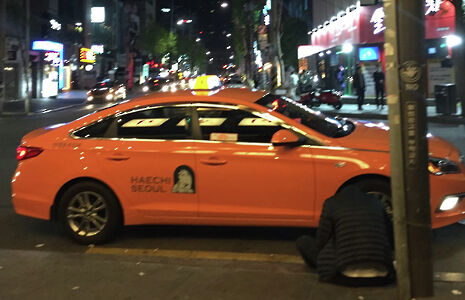When you can’t remember a night out, the camera certainly can
Felix Peckham shares his tale of an eventful night out in Seoul, and examines why we’re so keen to perform for the photographer

During the year that I took out between school and Cambridge I made several questionable decisions. Most were fuelled by alcohol and subsequently caught on camera. My first night in Seoul, for example, despite being very jet lagged, turned out to be ‘eventful’ – or at least the plethora of photos and videos would suggest so.
The photo stream begins with my friend and I – both vegetarians – gorging on buckets of Korean Fried Chicken. After this transgression of our sacrosanct ethical values, we proceed to a small booth in a bar where we consume South Korea’s infamous Soju drink, which had a far greater alcoholic content than we had anticipated.
Our inhibitions sufficiently lowered, we proceeded to one of Seoul’s nightclubs, where the photo stream goes quiet for a few hours. Then, at about 5am, a highly pixelated photo emerges of my travelling companion sitting on the pavement with his head in his hands, utterly dejected.
In terms of photographic evidence, or film in this case, the highlight of the night is contested. The award either goes to me having a verbal, and semi-physical, scuffle with a Korean gentleman over his inappropriate treatment of a woman. Similarly, our hotel’s CCTV footage of the two of us trying to enter the premises for about six minutes before becoming disillusioned and lying on the ground is also entertaining.
Such media is the permanent recording of memories, which, retrospectively, are reminiscent of a bizarre but very amusing night out. I wouldn’t want them to magically disappear, and certainly don’t wish that they hadn’t happened in the first place.
There is, however, a marked difference between the staged photos in a nightclub, under the harsh flash of the photographer, and the murky iPhone photo taken of a genuinely entertaining situation. The latter again falls into the category of wanting to preserve a moment for entertainment value. I will always choose the pixelated photo of me begging a Taiwanese police officer to arrest me, over the high definition photo of me inebriated in the smoking area of an inauspicious Cambridge club.
“The claustrophobic environment of a club, combined with the intimidating, and frankly bizarre, social insecurities that can arise from these instances are not assuaged by the looming threat of a photo”
Clubbing, or any other alcohol-fuelled occasion, wouldn’t be complete without a photo or video that embarrassingly exposes you across a variety of social media platforms. This phenomenon has become a regular feature of nights out and, for some, it can be critical in terms of the enjoyment or displeasure they derive from a night out. Increasingly, nights out are documented from beginning to end, creating an uncomfortable and performative tendency among individuals wanting to relax without having to be on alert for the seemingly omnipresent photographers.
As if the entire concept of clubbing and nights out wasn’t confusing enough, the constant threat of being photographed or filmed doing something foolish permeates the clubber’s mind-set. The series of events which begins by filling your body with alcohol, simply so your inhibitions are lowered, and then venturing to the dingy surroundings of a nightclub situated below a market town’s Waterstones is bewildering enough, and could really do without the pressure that the club’s photographer, as well as friend photographers, exert.
The apprehension generated by photo evidence of night-out antics is only exacerbated for those who suffer from anxiety. The claustrophobic environment of a club, combined with the intimidating, and frankly bizarre, social insecurities that can arise from these instances are not assuaged by the looming threat of a photo capturing you in this moment of particular discomfort.
For many, the additional element of photography, and the subsequent social media presence, makes nights out performative at the detriment of actually having an enjoyable time. Often, narcissism will supersede nonchalance – looking good in a photo will dominate the thought process, clouding any attempts to just simply enjoy yourself. Photos generate a sense of being obligatory just so that you can publicise that you have gone out, with a certain group of people, and so everybody else knows this – staged images of pretending to have fun become ubiquitous.
 Features / Should I stay or should I go? Cambridge students and alumni reflect on how their memories stay with them15 December 2025
Features / Should I stay or should I go? Cambridge students and alumni reflect on how their memories stay with them15 December 2025 News / Cambridge study finds students learn better with notes than AI13 December 2025
News / Cambridge study finds students learn better with notes than AI13 December 2025 News / Uni Scout and Guide Club affirms trans inclusion 12 December 2025
News / Uni Scout and Guide Club affirms trans inclusion 12 December 2025 Comment / The magic of an eight-week term15 December 2025
Comment / The magic of an eight-week term15 December 2025 News / Cambridge Vet School gets lifeline year to stay accredited28 November 2025
News / Cambridge Vet School gets lifeline year to stay accredited28 November 2025








